LLiC Module 3 Report: Intervention Strategies & Science Capital
VerifiedAdded on 2023/06/10
|18
|6738
|381
Report
AI Summary
This report provides a comprehensive analysis of educational interventions, focusing on the science capital teaching approach. It begins with a literature review that explores various intervention types, such as behavioral, collaborative, and classroom-based interventions, highlighting their benefits in addressing learning gaps and promoting student well-being. The report emphasizes the importance of creating engaging and personalized learning experiences, considering staff well-being, and leveraging individual strengths. It delves into the science capital teaching approach, which aims to enhance student engagement by connecting science concepts to real-life experiences and fostering a sense of value and recognition. The eight dimensions of science capital are discussed, including science literacy, attitudes, knowledge transferability, media consumption, and family involvement. The report underscores the effectiveness of the science capital teaching approach in improving student engagement and creating a comfortable learning environment. It also touches on the importance of analyzing school and local data for designing effective interventions, evaluating their impact, and continuously improving teaching practices to meet the diverse needs of students.
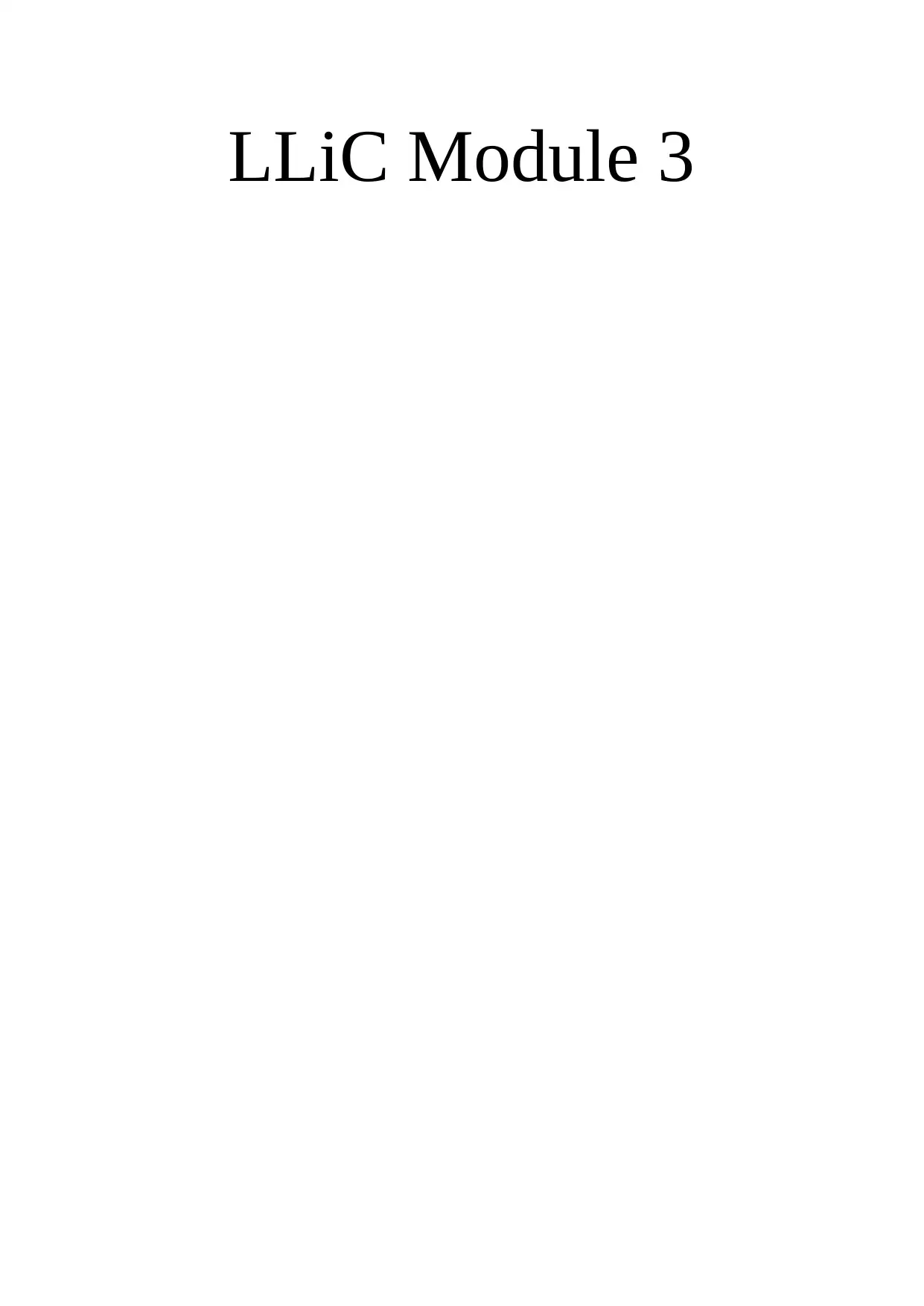
LLiC Module 3
Paraphrase This Document
Need a fresh take? Get an instant paraphrase of this document with our AI Paraphraser
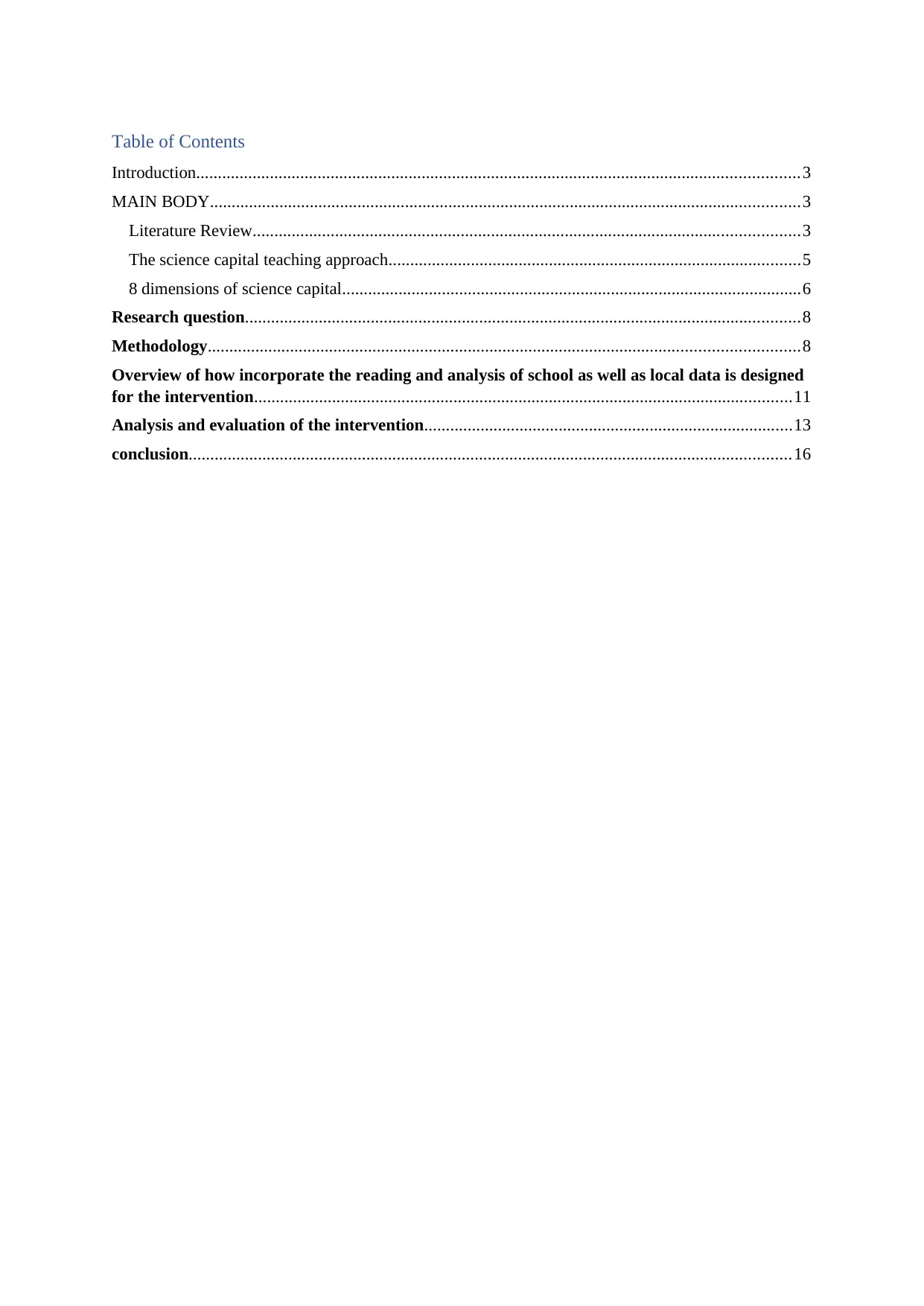
Table of Contents
Introduction...........................................................................................................................................3
MAIN BODY........................................................................................................................................3
Literature Review..............................................................................................................................3
The science capital teaching approach...............................................................................................5
8 dimensions of science capital..........................................................................................................6
Research question................................................................................................................................8
Methodology........................................................................................................................................8
Overview of how incorporate the reading and analysis of school as well as local data is designed
for the intervention............................................................................................................................11
Analysis and evaluation of the intervention.....................................................................................13
conclusion...........................................................................................................................................16
Introduction...........................................................................................................................................3
MAIN BODY........................................................................................................................................3
Literature Review..............................................................................................................................3
The science capital teaching approach...............................................................................................5
8 dimensions of science capital..........................................................................................................6
Research question................................................................................................................................8
Methodology........................................................................................................................................8
Overview of how incorporate the reading and analysis of school as well as local data is designed
for the intervention............................................................................................................................11
Analysis and evaluation of the intervention.....................................................................................13
conclusion...........................................................................................................................................16
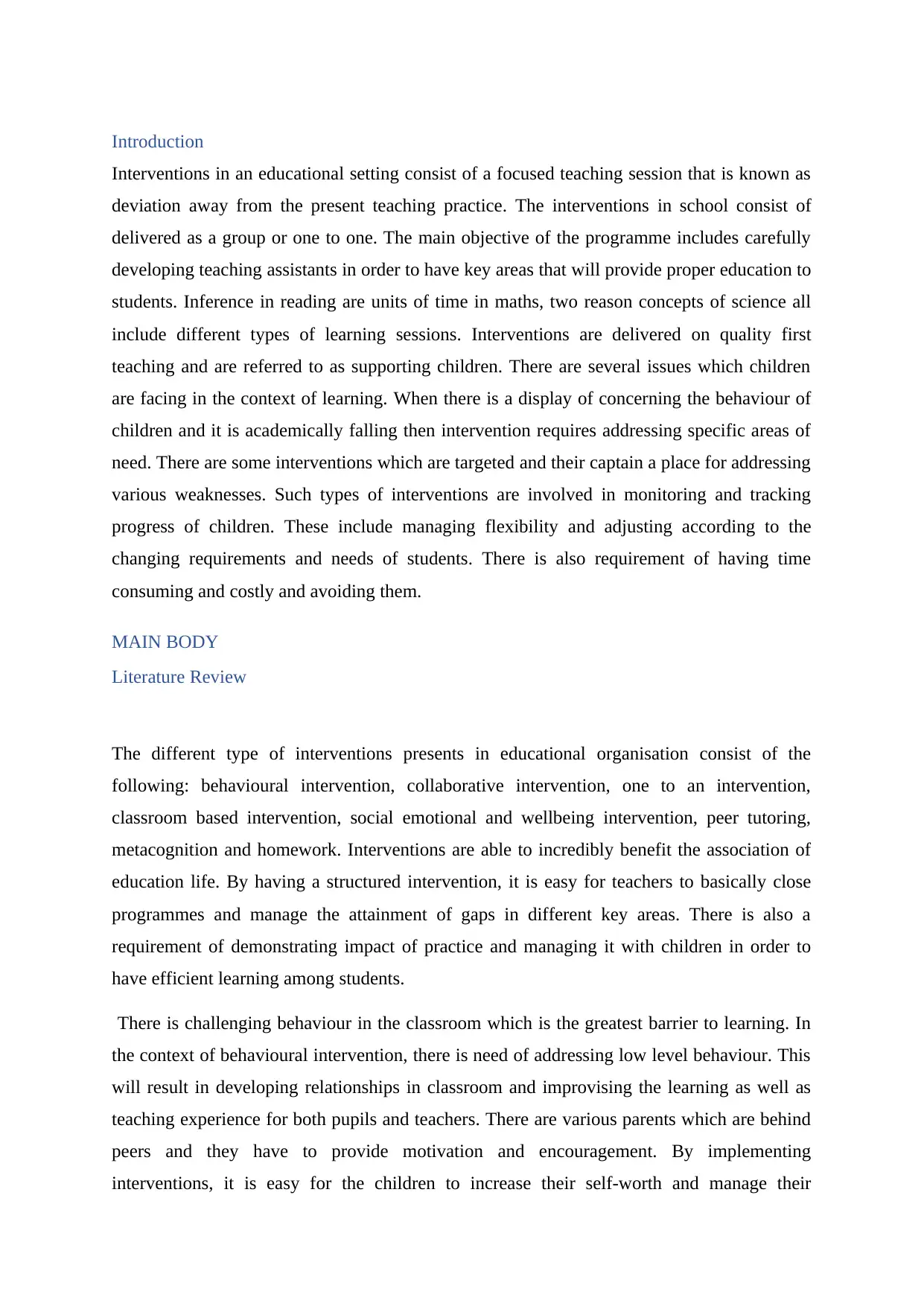
Introduction
Interventions in an educational setting consist of a focused teaching session that is known as
deviation away from the present teaching practice. The interventions in school consist of
delivered as a group or one to one. The main objective of the programme includes carefully
developing teaching assistants in order to have key areas that will provide proper education to
students. Inference in reading are units of time in maths, two reason concepts of science all
include different types of learning sessions. Interventions are delivered on quality first
teaching and are referred to as supporting children. There are several issues which children
are facing in the context of learning. When there is a display of concerning the behaviour of
children and it is academically falling then intervention requires addressing specific areas of
need. There are some interventions which are targeted and their captain a place for addressing
various weaknesses. Such types of interventions are involved in monitoring and tracking
progress of children. These include managing flexibility and adjusting according to the
changing requirements and needs of students. There is also requirement of having time
consuming and costly and avoiding them.
MAIN BODY
Literature Review
The different type of interventions presents in educational organisation consist of the
following: behavioural intervention, collaborative intervention, one to an intervention,
classroom based intervention, social emotional and wellbeing intervention, peer tutoring,
metacognition and homework. Interventions are able to incredibly benefit the association of
education life. By having a structured intervention, it is easy for teachers to basically close
programmes and manage the attainment of gaps in different key areas. There is also a
requirement of demonstrating impact of practice and managing it with children in order to
have efficient learning among students.
There is challenging behaviour in the classroom which is the greatest barrier to learning. In
the context of behavioural intervention, there is need of addressing low level behaviour. This
will result in developing relationships in classroom and improvising the learning as well as
teaching experience for both pupils and teachers. There are various parents which are behind
peers and they have to provide motivation and encouragement. By implementing
interventions, it is easy for the children to increase their self-worth and manage their
Interventions in an educational setting consist of a focused teaching session that is known as
deviation away from the present teaching practice. The interventions in school consist of
delivered as a group or one to one. The main objective of the programme includes carefully
developing teaching assistants in order to have key areas that will provide proper education to
students. Inference in reading are units of time in maths, two reason concepts of science all
include different types of learning sessions. Interventions are delivered on quality first
teaching and are referred to as supporting children. There are several issues which children
are facing in the context of learning. When there is a display of concerning the behaviour of
children and it is academically falling then intervention requires addressing specific areas of
need. There are some interventions which are targeted and their captain a place for addressing
various weaknesses. Such types of interventions are involved in monitoring and tracking
progress of children. These include managing flexibility and adjusting according to the
changing requirements and needs of students. There is also requirement of having time
consuming and costly and avoiding them.
MAIN BODY
Literature Review
The different type of interventions presents in educational organisation consist of the
following: behavioural intervention, collaborative intervention, one to an intervention,
classroom based intervention, social emotional and wellbeing intervention, peer tutoring,
metacognition and homework. Interventions are able to incredibly benefit the association of
education life. By having a structured intervention, it is easy for teachers to basically close
programmes and manage the attainment of gaps in different key areas. There is also a
requirement of demonstrating impact of practice and managing it with children in order to
have efficient learning among students.
There is challenging behaviour in the classroom which is the greatest barrier to learning. In
the context of behavioural intervention, there is need of addressing low level behaviour. This
will result in developing relationships in classroom and improvising the learning as well as
teaching experience for both pupils and teachers. There are various parents which are behind
peers and they have to provide motivation and encouragement. By implementing
interventions, it is easy for the children to increase their self-worth and manage their
⊘ This is a preview!⊘
Do you want full access?
Subscribe today to unlock all pages.

Trusted by 1+ million students worldwide
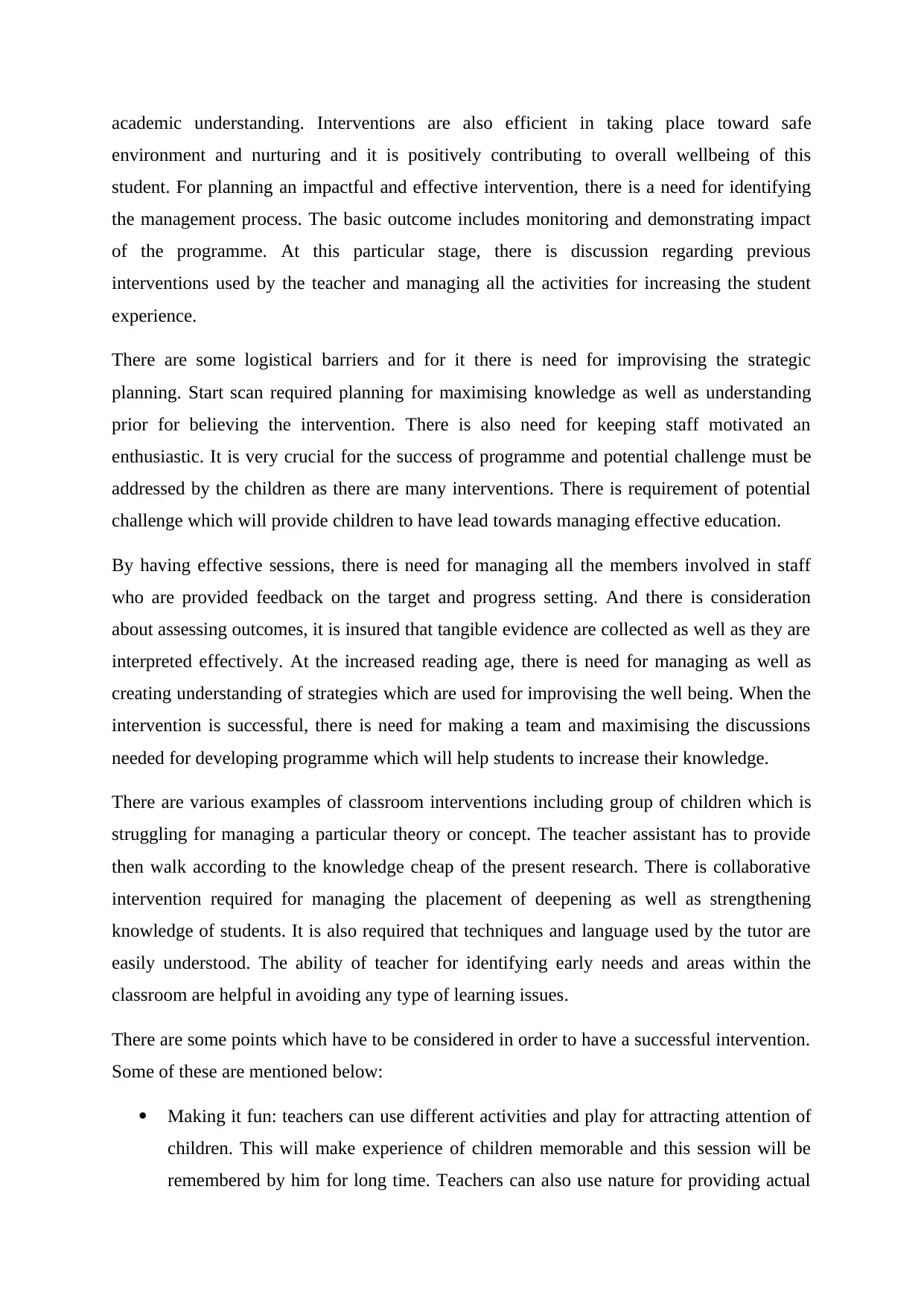
academic understanding. Interventions are also efficient in taking place toward safe
environment and nurturing and it is positively contributing to overall wellbeing of this
student. For planning an impactful and effective intervention, there is a need for identifying
the management process. The basic outcome includes monitoring and demonstrating impact
of the programme. At this particular stage, there is discussion regarding previous
interventions used by the teacher and managing all the activities for increasing the student
experience.
There are some logistical barriers and for it there is need for improvising the strategic
planning. Start scan required planning for maximising knowledge as well as understanding
prior for believing the intervention. There is also need for keeping staff motivated an
enthusiastic. It is very crucial for the success of programme and potential challenge must be
addressed by the children as there are many interventions. There is requirement of potential
challenge which will provide children to have lead towards managing effective education.
By having effective sessions, there is need for managing all the members involved in staff
who are provided feedback on the target and progress setting. And there is consideration
about assessing outcomes, it is insured that tangible evidence are collected as well as they are
interpreted effectively. At the increased reading age, there is need for managing as well as
creating understanding of strategies which are used for improvising the well being. When the
intervention is successful, there is need for making a team and maximising the discussions
needed for developing programme which will help students to increase their knowledge.
There are various examples of classroom interventions including group of children which is
struggling for managing a particular theory or concept. The teacher assistant has to provide
then walk according to the knowledge cheap of the present research. There is collaborative
intervention required for managing the placement of deepening as well as strengthening
knowledge of students. It is also required that techniques and language used by the tutor are
easily understood. The ability of teacher for identifying early needs and areas within the
classroom are helpful in avoiding any type of learning issues.
There are some points which have to be considered in order to have a successful intervention.
Some of these are mentioned below:
Making it fun: teachers can use different activities and play for attracting attention of
children. This will make experience of children memorable and this session will be
remembered by him for long time. Teachers can also use nature for providing actual
environment and nurturing and it is positively contributing to overall wellbeing of this
student. For planning an impactful and effective intervention, there is a need for identifying
the management process. The basic outcome includes monitoring and demonstrating impact
of the programme. At this particular stage, there is discussion regarding previous
interventions used by the teacher and managing all the activities for increasing the student
experience.
There are some logistical barriers and for it there is need for improvising the strategic
planning. Start scan required planning for maximising knowledge as well as understanding
prior for believing the intervention. There is also need for keeping staff motivated an
enthusiastic. It is very crucial for the success of programme and potential challenge must be
addressed by the children as there are many interventions. There is requirement of potential
challenge which will provide children to have lead towards managing effective education.
By having effective sessions, there is need for managing all the members involved in staff
who are provided feedback on the target and progress setting. And there is consideration
about assessing outcomes, it is insured that tangible evidence are collected as well as they are
interpreted effectively. At the increased reading age, there is need for managing as well as
creating understanding of strategies which are used for improvising the well being. When the
intervention is successful, there is need for making a team and maximising the discussions
needed for developing programme which will help students to increase their knowledge.
There are various examples of classroom interventions including group of children which is
struggling for managing a particular theory or concept. The teacher assistant has to provide
then walk according to the knowledge cheap of the present research. There is collaborative
intervention required for managing the placement of deepening as well as strengthening
knowledge of students. It is also required that techniques and language used by the tutor are
easily understood. The ability of teacher for identifying early needs and areas within the
classroom are helpful in avoiding any type of learning issues.
There are some points which have to be considered in order to have a successful intervention.
Some of these are mentioned below:
Making it fun: teachers can use different activities and play for attracting attention of
children. This will make experience of children memorable and this session will be
remembered by him for long time. Teachers can also use nature for providing actual
Paraphrase This Document
Need a fresh take? Get an instant paraphrase of this document with our AI Paraphraser
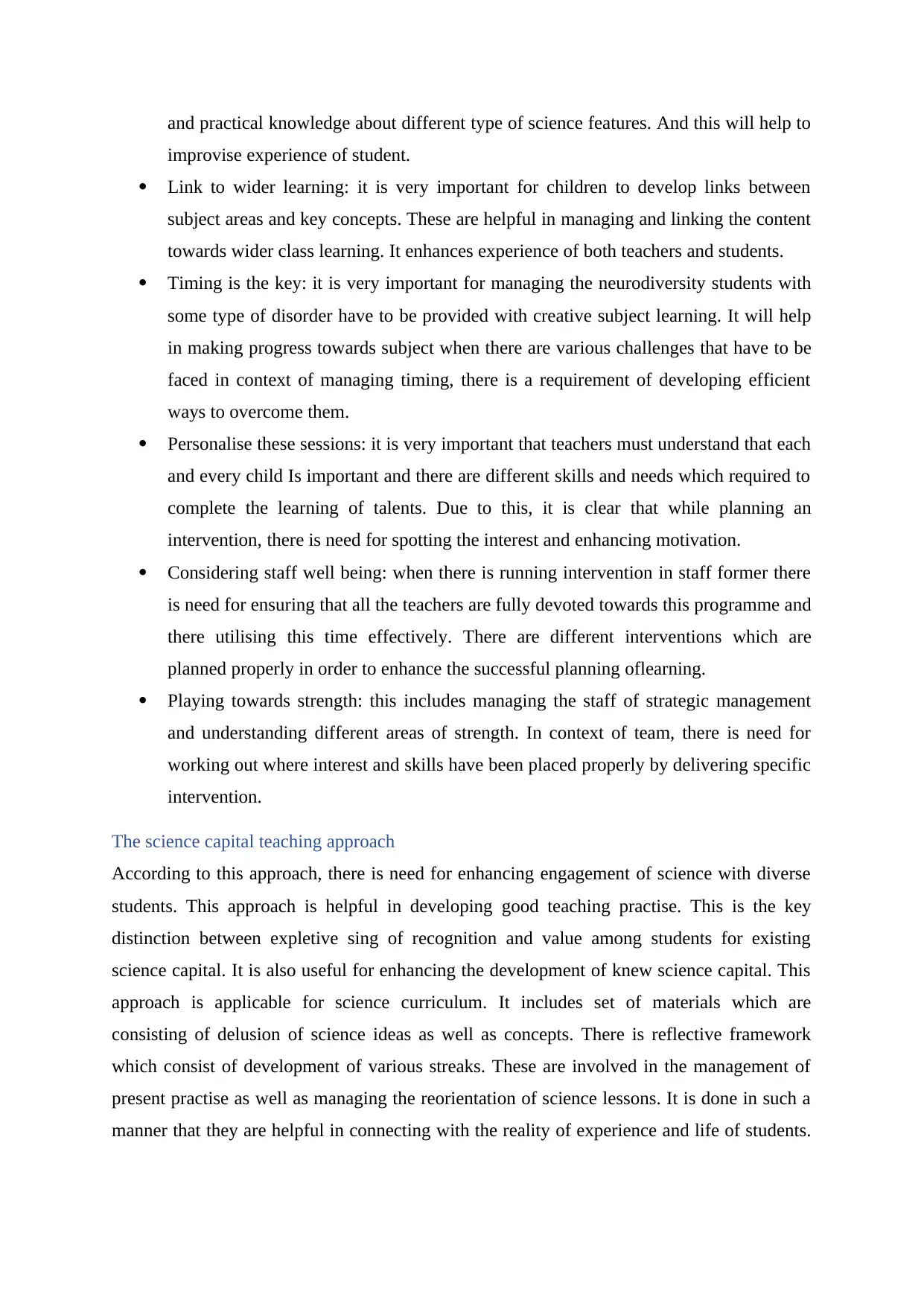
and practical knowledge about different type of science features. And this will help to
improvise experience of student.
Link to wider learning: it is very important for children to develop links between
subject areas and key concepts. These are helpful in managing and linking the content
towards wider class learning. It enhances experience of both teachers and students.
Timing is the key: it is very important for managing the neurodiversity students with
some type of disorder have to be provided with creative subject learning. It will help
in making progress towards subject when there are various challenges that have to be
faced in context of managing timing, there is a requirement of developing efficient
ways to overcome them.
Personalise these sessions: it is very important that teachers must understand that each
and every child Is important and there are different skills and needs which required to
complete the learning of talents. Due to this, it is clear that while planning an
intervention, there is need for spotting the interest and enhancing motivation.
Considering staff well being: when there is running intervention in staff former there
is need for ensuring that all the teachers are fully devoted towards this programme and
there utilising this time effectively. There are different interventions which are
planned properly in order to enhance the successful planning oflearning.
Playing towards strength: this includes managing the staff of strategic management
and understanding different areas of strength. In context of team, there is need for
working out where interest and skills have been placed properly by delivering specific
intervention.
The science capital teaching approach
According to this approach, there is need for enhancing engagement of science with diverse
students. This approach is helpful in developing good teaching practise. This is the key
distinction between expletive sing of recognition and value among students for existing
science capital. It is also useful for enhancing the development of knew science capital. This
approach is applicable for science curriculum. It includes set of materials which are
consisting of delusion of science ideas as well as concepts. There is reflective framework
which consist of development of various streaks. These are involved in the management of
present practise as well as managing the reorientation of science lessons. It is done in such a
manner that they are helpful in connecting with the reality of experience and life of students.
improvise experience of student.
Link to wider learning: it is very important for children to develop links between
subject areas and key concepts. These are helpful in managing and linking the content
towards wider class learning. It enhances experience of both teachers and students.
Timing is the key: it is very important for managing the neurodiversity students with
some type of disorder have to be provided with creative subject learning. It will help
in making progress towards subject when there are various challenges that have to be
faced in context of managing timing, there is a requirement of developing efficient
ways to overcome them.
Personalise these sessions: it is very important that teachers must understand that each
and every child Is important and there are different skills and needs which required to
complete the learning of talents. Due to this, it is clear that while planning an
intervention, there is need for spotting the interest and enhancing motivation.
Considering staff well being: when there is running intervention in staff former there
is need for ensuring that all the teachers are fully devoted towards this programme and
there utilising this time effectively. There are different interventions which are
planned properly in order to enhance the successful planning oflearning.
Playing towards strength: this includes managing the staff of strategic management
and understanding different areas of strength. In context of team, there is need for
working out where interest and skills have been placed properly by delivering specific
intervention.
The science capital teaching approach
According to this approach, there is need for enhancing engagement of science with diverse
students. This approach is helpful in developing good teaching practise. This is the key
distinction between expletive sing of recognition and value among students for existing
science capital. It is also useful for enhancing the development of knew science capital. This
approach is applicable for science curriculum. It includes set of materials which are
consisting of delusion of science ideas as well as concepts. There is reflective framework
which consist of development of various streaks. These are involved in the management of
present practise as well as managing the reorientation of science lessons. It is done in such a
manner that they are helpful in connecting with the reality of experience and life of students.
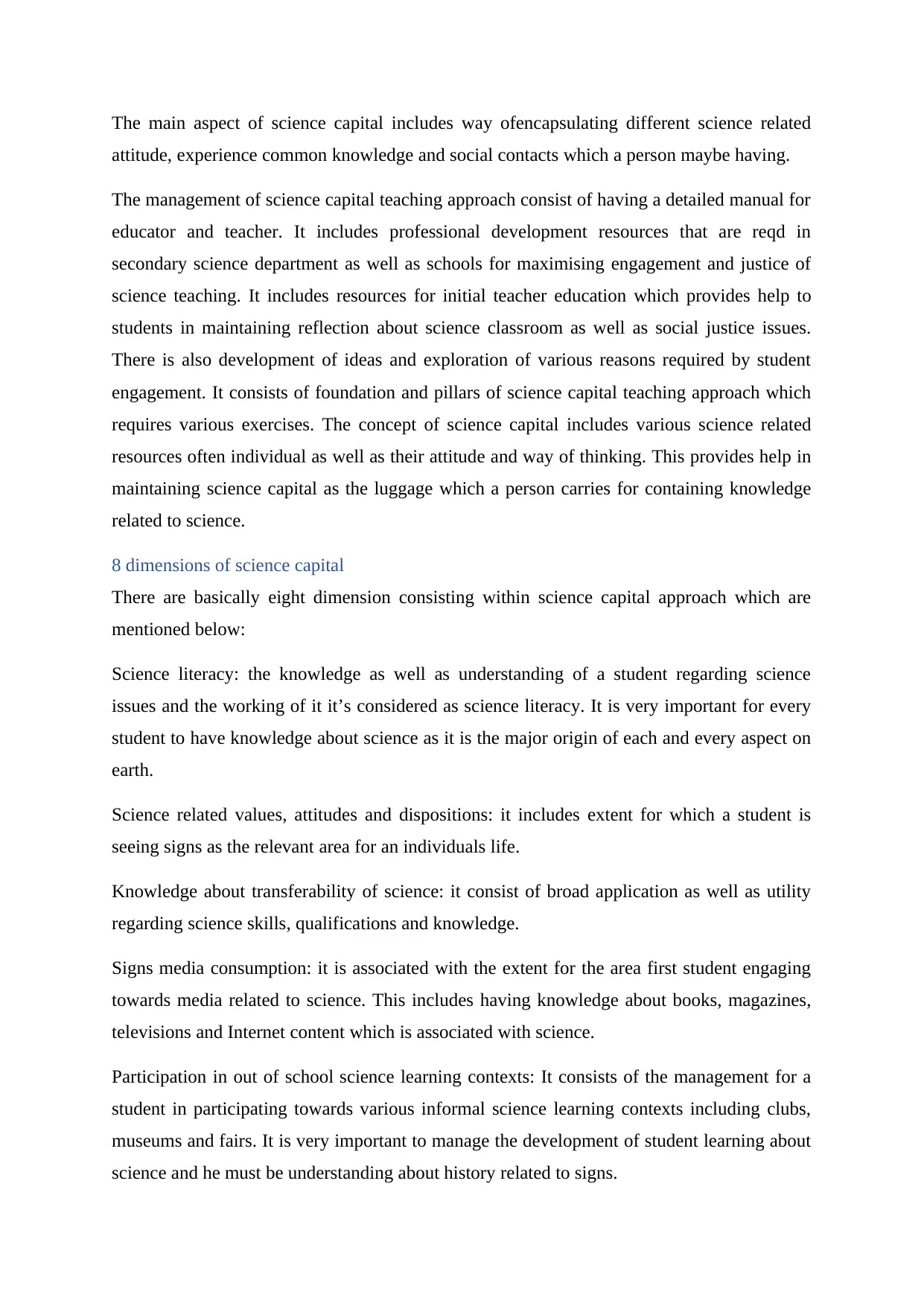
The main aspect of science capital includes way ofencapsulating different science related
attitude, experience common knowledge and social contacts which a person maybe having.
The management of science capital teaching approach consist of having a detailed manual for
educator and teacher. It includes professional development resources that are reqd in
secondary science department as well as schools for maximising engagement and justice of
science teaching. It includes resources for initial teacher education which provides help to
students in maintaining reflection about science classroom as well as social justice issues.
There is also development of ideas and exploration of various reasons required by student
engagement. It consists of foundation and pillars of science capital teaching approach which
requires various exercises. The concept of science capital includes various science related
resources often individual as well as their attitude and way of thinking. This provides help in
maintaining science capital as the luggage which a person carries for containing knowledge
related to science.
8 dimensions of science capital
There are basically eight dimension consisting within science capital approach which are
mentioned below:
Science literacy: the knowledge as well as understanding of a student regarding science
issues and the working of it it’s considered as science literacy. It is very important for every
student to have knowledge about science as it is the major origin of each and every aspect on
earth.
Science related values, attitudes and dispositions: it includes extent for which a student is
seeing signs as the relevant area for an individuals life.
Knowledge about transferability of science: it consist of broad application as well as utility
regarding science skills, qualifications and knowledge.
Signs media consumption: it is associated with the extent for the area first student engaging
towards media related to science. This includes having knowledge about books, magazines,
televisions and Internet content which is associated with science.
Participation in out of school science learning contexts: It consists of the management for a
student in participating towards various informal science learning contexts including clubs,
museums and fairs. It is very important to manage the development of student learning about
science and he must be understanding about history related to signs.
attitude, experience common knowledge and social contacts which a person maybe having.
The management of science capital teaching approach consist of having a detailed manual for
educator and teacher. It includes professional development resources that are reqd in
secondary science department as well as schools for maximising engagement and justice of
science teaching. It includes resources for initial teacher education which provides help to
students in maintaining reflection about science classroom as well as social justice issues.
There is also development of ideas and exploration of various reasons required by student
engagement. It consists of foundation and pillars of science capital teaching approach which
requires various exercises. The concept of science capital includes various science related
resources often individual as well as their attitude and way of thinking. This provides help in
maintaining science capital as the luggage which a person carries for containing knowledge
related to science.
8 dimensions of science capital
There are basically eight dimension consisting within science capital approach which are
mentioned below:
Science literacy: the knowledge as well as understanding of a student regarding science
issues and the working of it it’s considered as science literacy. It is very important for every
student to have knowledge about science as it is the major origin of each and every aspect on
earth.
Science related values, attitudes and dispositions: it includes extent for which a student is
seeing signs as the relevant area for an individuals life.
Knowledge about transferability of science: it consist of broad application as well as utility
regarding science skills, qualifications and knowledge.
Signs media consumption: it is associated with the extent for the area first student engaging
towards media related to science. This includes having knowledge about books, magazines,
televisions and Internet content which is associated with science.
Participation in out of school science learning contexts: It consists of the management for a
student in participating towards various informal science learning contexts including clubs,
museums and fairs. It is very important to manage the development of student learning about
science and he must be understanding about history related to signs.
⊘ This is a preview!⊘
Do you want full access?
Subscribe today to unlock all pages.

Trusted by 1+ million students worldwide
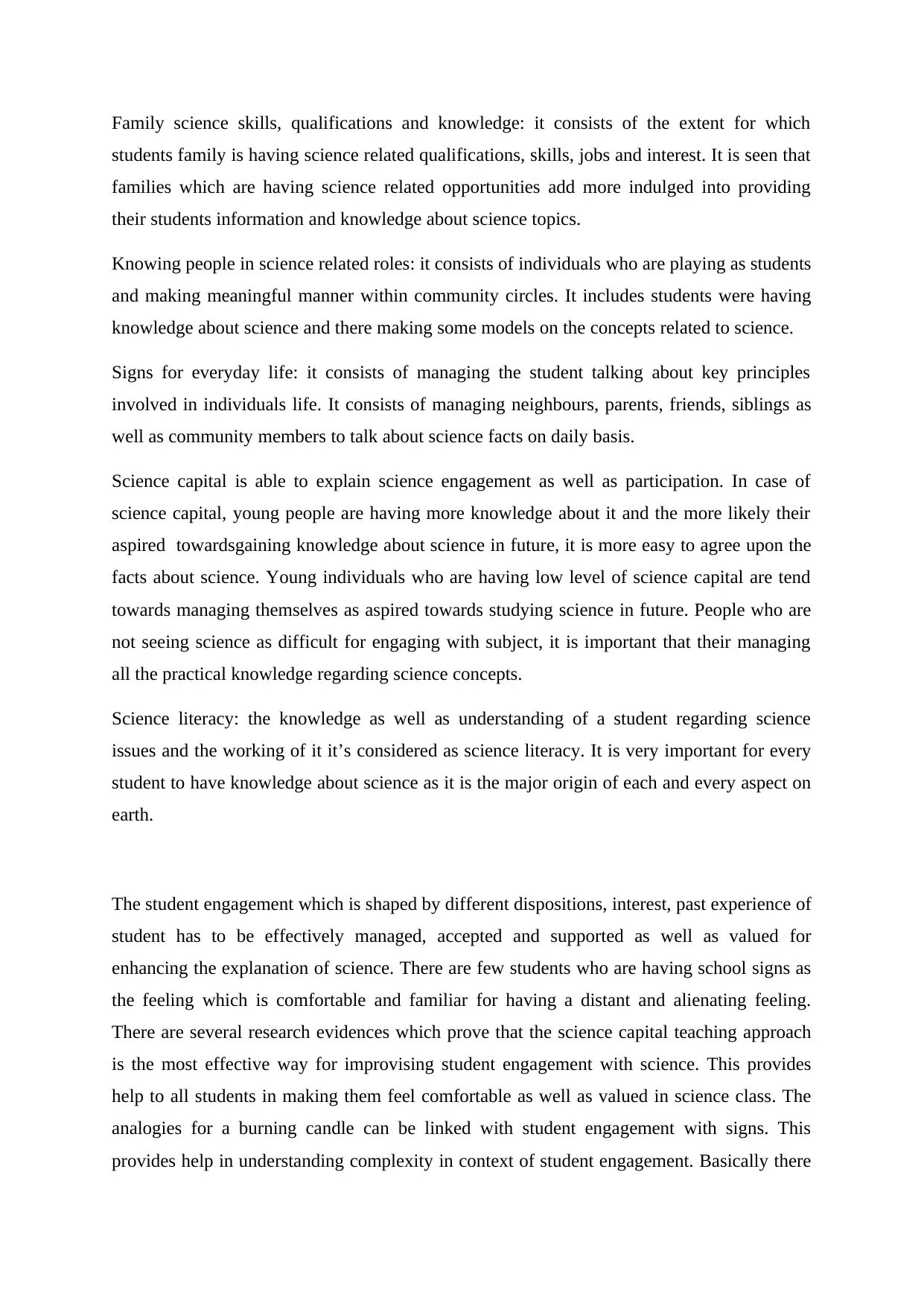
Family science skills, qualifications and knowledge: it consists of the extent for which
students family is having science related qualifications, skills, jobs and interest. It is seen that
families which are having science related opportunities add more indulged into providing
their students information and knowledge about science topics.
Knowing people in science related roles: it consists of individuals who are playing as students
and making meaningful manner within community circles. It includes students were having
knowledge about science and there making some models on the concepts related to science.
Signs for everyday life: it consists of managing the student talking about key principles
involved in individuals life. It consists of managing neighbours, parents, friends, siblings as
well as community members to talk about science facts on daily basis.
Science capital is able to explain science engagement as well as participation. In case of
science capital, young people are having more knowledge about it and the more likely their
aspired towardsgaining knowledge about science in future, it is more easy to agree upon the
facts about science. Young individuals who are having low level of science capital are tend
towards managing themselves as aspired towards studying science in future. People who are
not seeing science as difficult for engaging with subject, it is important that their managing
all the practical knowledge regarding science concepts.
Science literacy: the knowledge as well as understanding of a student regarding science
issues and the working of it it’s considered as science literacy. It is very important for every
student to have knowledge about science as it is the major origin of each and every aspect on
earth.
The student engagement which is shaped by different dispositions, interest, past experience of
student has to be effectively managed, accepted and supported as well as valued for
enhancing the explanation of science. There are few students who are having school signs as
the feeling which is comfortable and familiar for having a distant and alienating feeling.
There are several research evidences which prove that the science capital teaching approach
is the most effective way for improvising student engagement with science. This provides
help to all students in making them feel comfortable as well as valued in science class. The
analogies for a burning candle can be linked with student engagement with signs. This
provides help in understanding complexity in context of student engagement. Basically there
students family is having science related qualifications, skills, jobs and interest. It is seen that
families which are having science related opportunities add more indulged into providing
their students information and knowledge about science topics.
Knowing people in science related roles: it consists of individuals who are playing as students
and making meaningful manner within community circles. It includes students were having
knowledge about science and there making some models on the concepts related to science.
Signs for everyday life: it consists of managing the student talking about key principles
involved in individuals life. It consists of managing neighbours, parents, friends, siblings as
well as community members to talk about science facts on daily basis.
Science capital is able to explain science engagement as well as participation. In case of
science capital, young people are having more knowledge about it and the more likely their
aspired towardsgaining knowledge about science in future, it is more easy to agree upon the
facts about science. Young individuals who are having low level of science capital are tend
towards managing themselves as aspired towards studying science in future. People who are
not seeing science as difficult for engaging with subject, it is important that their managing
all the practical knowledge regarding science concepts.
Science literacy: the knowledge as well as understanding of a student regarding science
issues and the working of it it’s considered as science literacy. It is very important for every
student to have knowledge about science as it is the major origin of each and every aspect on
earth.
The student engagement which is shaped by different dispositions, interest, past experience of
student has to be effectively managed, accepted and supported as well as valued for
enhancing the explanation of science. There are few students who are having school signs as
the feeling which is comfortable and familiar for having a distant and alienating feeling.
There are several research evidences which prove that the science capital teaching approach
is the most effective way for improvising student engagement with science. This provides
help to all students in making them feel comfortable as well as valued in science class. The
analogies for a burning candle can be linked with student engagement with signs. This
provides help in understanding complexity in context of student engagement. Basically there
Paraphrase This Document
Need a fresh take? Get an instant paraphrase of this document with our AI Paraphraser
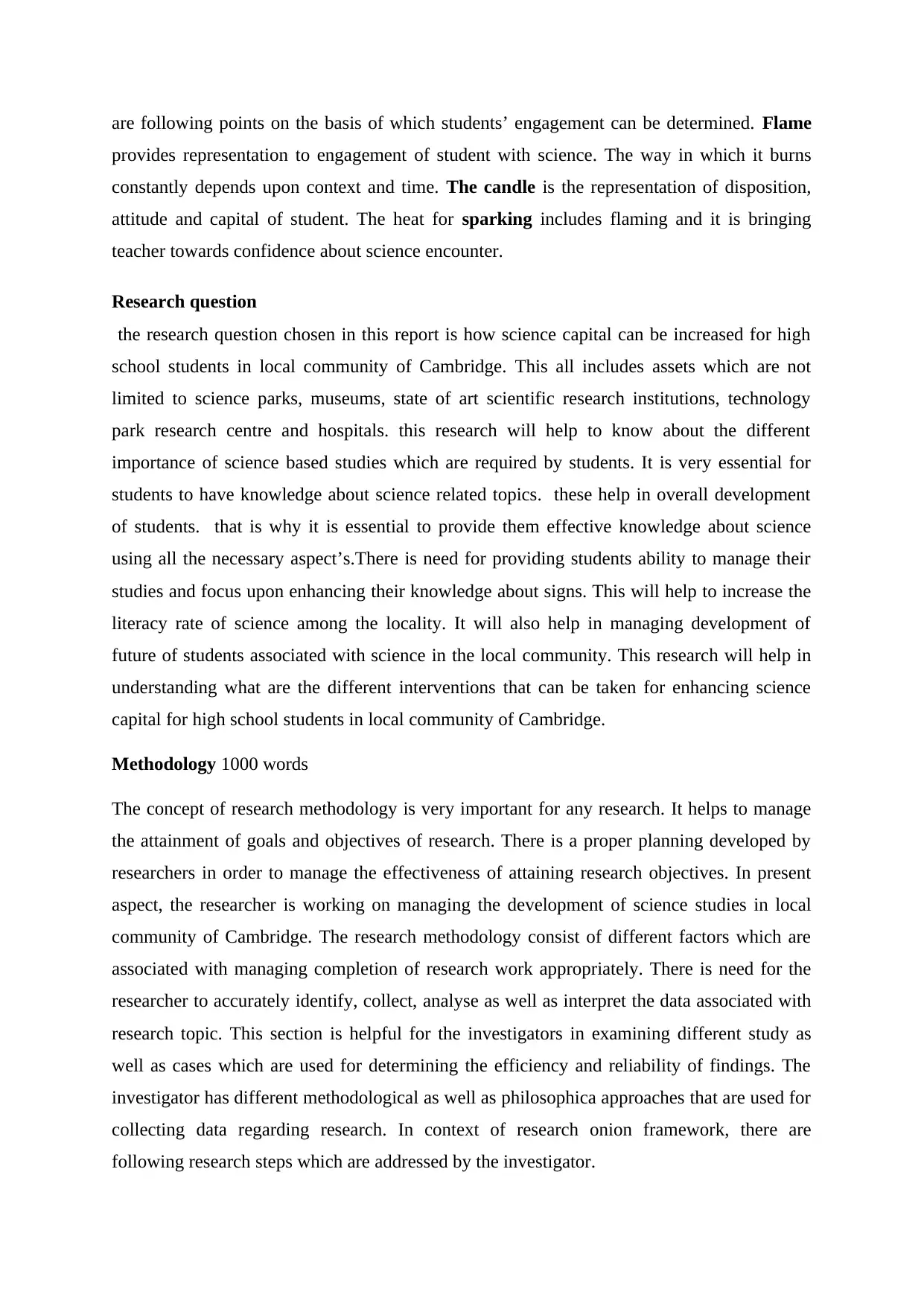
are following points on the basis of which students’ engagement can be determined. Flame
provides representation to engagement of student with science. The way in which it burns
constantly depends upon context and time. The candle is the representation of disposition,
attitude and capital of student. The heat for sparking includes flaming and it is bringing
teacher towards confidence about science encounter.
Research question
the research question chosen in this report is how science capital can be increased for high
school students in local community of Cambridge. This all includes assets which are not
limited to science parks, museums, state of art scientific research institutions, technology
park research centre and hospitals. this research will help to know about the different
importance of science based studies which are required by students. It is very essential for
students to have knowledge about science related topics. these help in overall development
of students. that is why it is essential to provide them effective knowledge about science
using all the necessary aspect’s.There is need for providing students ability to manage their
studies and focus upon enhancing their knowledge about signs. This will help to increase the
literacy rate of science among the locality. It will also help in managing development of
future of students associated with science in the local community. This research will help in
understanding what are the different interventions that can be taken for enhancing science
capital for high school students in local community of Cambridge.
Methodology 1000 words
The concept of research methodology is very important for any research. It helps to manage
the attainment of goals and objectives of research. There is a proper planning developed by
researchers in order to manage the effectiveness of attaining research objectives. In present
aspect, the researcher is working on managing the development of science studies in local
community of Cambridge. The research methodology consist of different factors which are
associated with managing completion of research work appropriately. There is need for the
researcher to accurately identify, collect, analyse as well as interpret the data associated with
research topic. This section is helpful for the investigators in examining different study as
well as cases which are used for determining the efficiency and reliability of findings. The
investigator has different methodological as well as philosophica approaches that are used for
collecting data regarding research. In context of research onion framework, there are
following research steps which are addressed by the investigator.
provides representation to engagement of student with science. The way in which it burns
constantly depends upon context and time. The candle is the representation of disposition,
attitude and capital of student. The heat for sparking includes flaming and it is bringing
teacher towards confidence about science encounter.
Research question
the research question chosen in this report is how science capital can be increased for high
school students in local community of Cambridge. This all includes assets which are not
limited to science parks, museums, state of art scientific research institutions, technology
park research centre and hospitals. this research will help to know about the different
importance of science based studies which are required by students. It is very essential for
students to have knowledge about science related topics. these help in overall development
of students. that is why it is essential to provide them effective knowledge about science
using all the necessary aspect’s.There is need for providing students ability to manage their
studies and focus upon enhancing their knowledge about signs. This will help to increase the
literacy rate of science among the locality. It will also help in managing development of
future of students associated with science in the local community. This research will help in
understanding what are the different interventions that can be taken for enhancing science
capital for high school students in local community of Cambridge.
Methodology 1000 words
The concept of research methodology is very important for any research. It helps to manage
the attainment of goals and objectives of research. There is a proper planning developed by
researchers in order to manage the effectiveness of attaining research objectives. In present
aspect, the researcher is working on managing the development of science studies in local
community of Cambridge. The research methodology consist of different factors which are
associated with managing completion of research work appropriately. There is need for the
researcher to accurately identify, collect, analyse as well as interpret the data associated with
research topic. This section is helpful for the investigators in examining different study as
well as cases which are used for determining the efficiency and reliability of findings. The
investigator has different methodological as well as philosophica approaches that are used for
collecting data regarding research. In context of research onion framework, there are
following research steps which are addressed by the investigator.
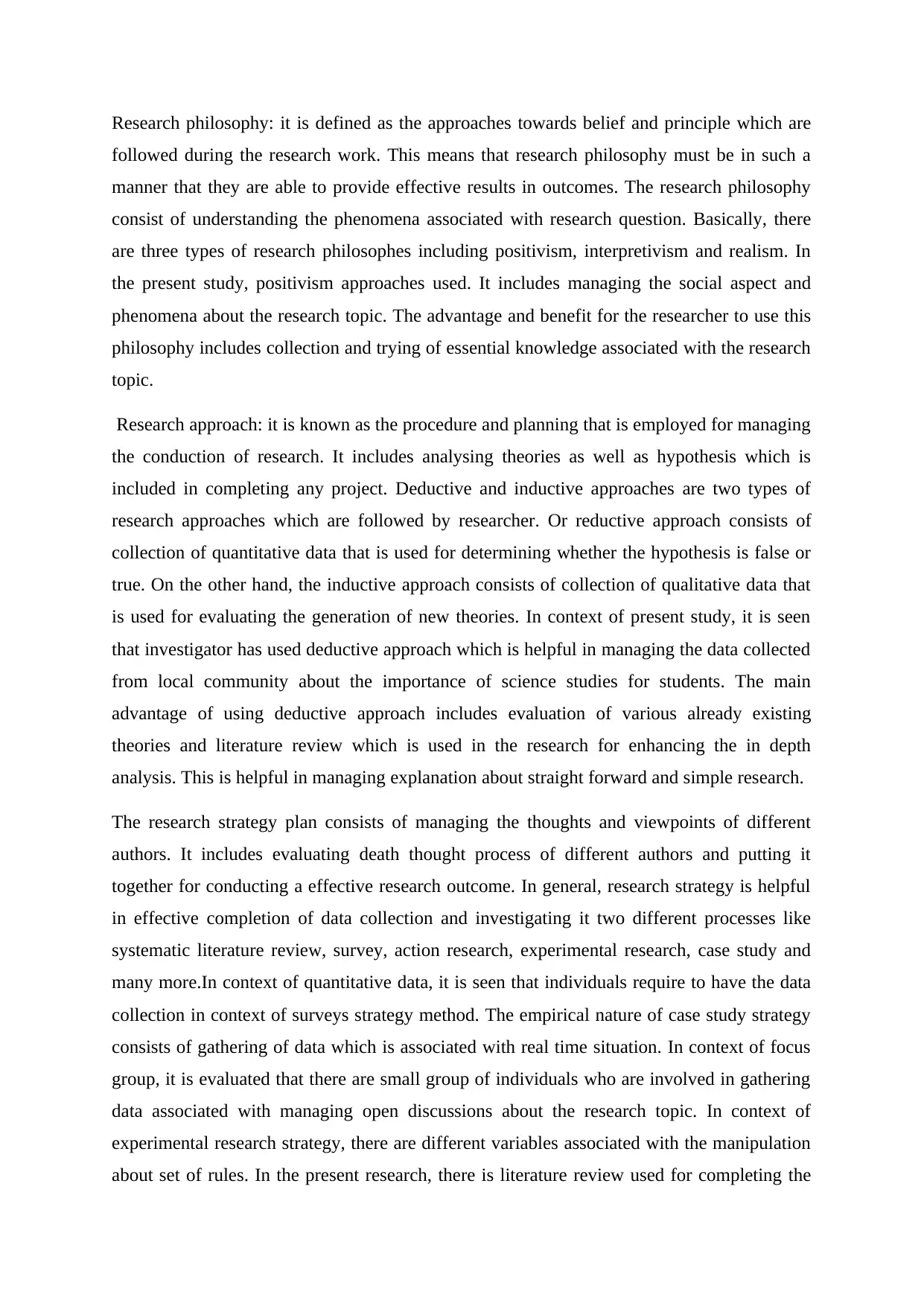
Research philosophy: it is defined as the approaches towards belief and principle which are
followed during the research work. This means that research philosophy must be in such a
manner that they are able to provide effective results in outcomes. The research philosophy
consist of understanding the phenomena associated with research question. Basically, there
are three types of research philosophes including positivism, interpretivism and realism. In
the present study, positivism approaches used. It includes managing the social aspect and
phenomena about the research topic. The advantage and benefit for the researcher to use this
philosophy includes collection and trying of essential knowledge associated with the research
topic.
Research approach: it is known as the procedure and planning that is employed for managing
the conduction of research. It includes analysing theories as well as hypothesis which is
included in completing any project. Deductive and inductive approaches are two types of
research approaches which are followed by researcher. Or reductive approach consists of
collection of quantitative data that is used for determining whether the hypothesis is false or
true. On the other hand, the inductive approach consists of collection of qualitative data that
is used for evaluating the generation of new theories. In context of present study, it is seen
that investigator has used deductive approach which is helpful in managing the data collected
from local community about the importance of science studies for students. The main
advantage of using deductive approach includes evaluation of various already existing
theories and literature review which is used in the research for enhancing the in depth
analysis. This is helpful in managing explanation about straight forward and simple research.
The research strategy plan consists of managing the thoughts and viewpoints of different
authors. It includes evaluating death thought process of different authors and putting it
together for conducting a effective research outcome. In general, research strategy is helpful
in effective completion of data collection and investigating it two different processes like
systematic literature review, survey, action research, experimental research, case study and
many more.In context of quantitative data, it is seen that individuals require to have the data
collection in context of surveys strategy method. The empirical nature of case study strategy
consists of gathering of data which is associated with real time situation. In context of focus
group, it is evaluated that there are small group of individuals who are involved in gathering
data associated with managing open discussions about the research topic. In context of
experimental research strategy, there are different variables associated with the manipulation
about set of rules. In the present research, there is literature review used for completing the
followed during the research work. This means that research philosophy must be in such a
manner that they are able to provide effective results in outcomes. The research philosophy
consist of understanding the phenomena associated with research question. Basically, there
are three types of research philosophes including positivism, interpretivism and realism. In
the present study, positivism approaches used. It includes managing the social aspect and
phenomena about the research topic. The advantage and benefit for the researcher to use this
philosophy includes collection and trying of essential knowledge associated with the research
topic.
Research approach: it is known as the procedure and planning that is employed for managing
the conduction of research. It includes analysing theories as well as hypothesis which is
included in completing any project. Deductive and inductive approaches are two types of
research approaches which are followed by researcher. Or reductive approach consists of
collection of quantitative data that is used for determining whether the hypothesis is false or
true. On the other hand, the inductive approach consists of collection of qualitative data that
is used for evaluating the generation of new theories. In context of present study, it is seen
that investigator has used deductive approach which is helpful in managing the data collected
from local community about the importance of science studies for students. The main
advantage of using deductive approach includes evaluation of various already existing
theories and literature review which is used in the research for enhancing the in depth
analysis. This is helpful in managing explanation about straight forward and simple research.
The research strategy plan consists of managing the thoughts and viewpoints of different
authors. It includes evaluating death thought process of different authors and putting it
together for conducting a effective research outcome. In general, research strategy is helpful
in effective completion of data collection and investigating it two different processes like
systematic literature review, survey, action research, experimental research, case study and
many more.In context of quantitative data, it is seen that individuals require to have the data
collection in context of surveys strategy method. The empirical nature of case study strategy
consists of gathering of data which is associated with real time situation. In context of focus
group, it is evaluated that there are small group of individuals who are involved in gathering
data associated with managing open discussions about the research topic. In context of
experimental research strategy, there are different variables associated with the manipulation
about set of rules. In the present research, there is literature review used for completing the
⊘ This is a preview!⊘
Do you want full access?
Subscribe today to unlock all pages.

Trusted by 1+ million students worldwide
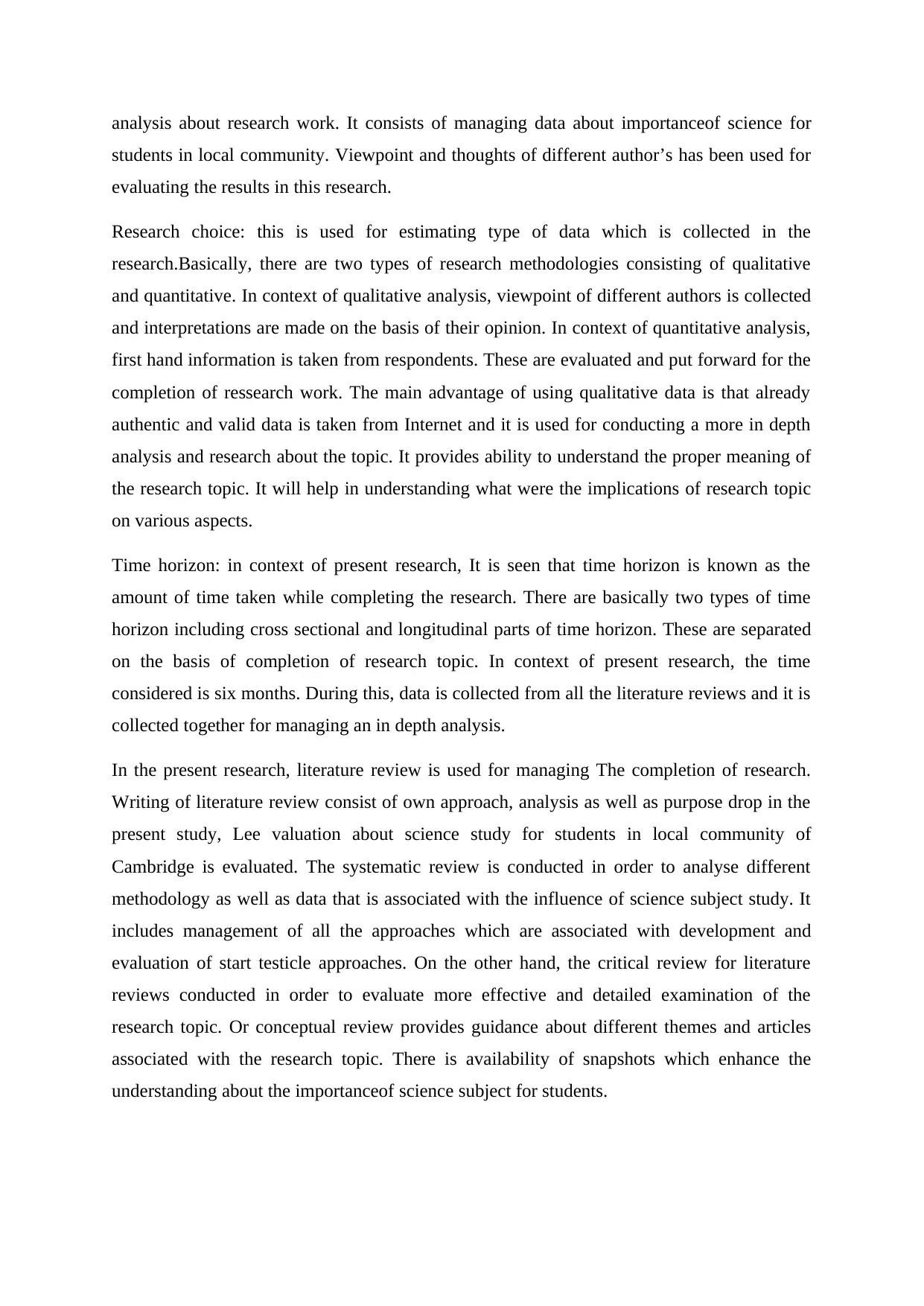
analysis about research work. It consists of managing data about importanceof science for
students in local community. Viewpoint and thoughts of different author’s has been used for
evaluating the results in this research.
Research choice: this is used for estimating type of data which is collected in the
research.Basically, there are two types of research methodologies consisting of qualitative
and quantitative. In context of qualitative analysis, viewpoint of different authors is collected
and interpretations are made on the basis of their opinion. In context of quantitative analysis,
first hand information is taken from respondents. These are evaluated and put forward for the
completion of ressearch work. The main advantage of using qualitative data is that already
authentic and valid data is taken from Internet and it is used for conducting a more in depth
analysis and research about the topic. It provides ability to understand the proper meaning of
the research topic. It will help in understanding what were the implications of research topic
on various aspects.
Time horizon: in context of present research, It is seen that time horizon is known as the
amount of time taken while completing the research. There are basically two types of time
horizon including cross sectional and longitudinal parts of time horizon. These are separated
on the basis of completion of research topic. In context of present research, the time
considered is six months. During this, data is collected from all the literature reviews and it is
collected together for managing an in depth analysis.
In the present research, literature review is used for managing The completion of research.
Writing of literature review consist of own approach, analysis as well as purpose drop in the
present study, Lee valuation about science study for students in local community of
Cambridge is evaluated. The systematic review is conducted in order to analyse different
methodology as well as data that is associated with the influence of science subject study. It
includes management of all the approaches which are associated with development and
evaluation of start testicle approaches. On the other hand, the critical review for literature
reviews conducted in order to evaluate more effective and detailed examination of the
research topic. Or conceptual review provides guidance about different themes and articles
associated with the research topic. There is availability of snapshots which enhance the
understanding about the importanceof science subject for students.
students in local community. Viewpoint and thoughts of different author’s has been used for
evaluating the results in this research.
Research choice: this is used for estimating type of data which is collected in the
research.Basically, there are two types of research methodologies consisting of qualitative
and quantitative. In context of qualitative analysis, viewpoint of different authors is collected
and interpretations are made on the basis of their opinion. In context of quantitative analysis,
first hand information is taken from respondents. These are evaluated and put forward for the
completion of ressearch work. The main advantage of using qualitative data is that already
authentic and valid data is taken from Internet and it is used for conducting a more in depth
analysis and research about the topic. It provides ability to understand the proper meaning of
the research topic. It will help in understanding what were the implications of research topic
on various aspects.
Time horizon: in context of present research, It is seen that time horizon is known as the
amount of time taken while completing the research. There are basically two types of time
horizon including cross sectional and longitudinal parts of time horizon. These are separated
on the basis of completion of research topic. In context of present research, the time
considered is six months. During this, data is collected from all the literature reviews and it is
collected together for managing an in depth analysis.
In the present research, literature review is used for managing The completion of research.
Writing of literature review consist of own approach, analysis as well as purpose drop in the
present study, Lee valuation about science study for students in local community of
Cambridge is evaluated. The systematic review is conducted in order to analyse different
methodology as well as data that is associated with the influence of science subject study. It
includes management of all the approaches which are associated with development and
evaluation of start testicle approaches. On the other hand, the critical review for literature
reviews conducted in order to evaluate more effective and detailed examination of the
research topic. Or conceptual review provides guidance about different themes and articles
associated with the research topic. There is availability of snapshots which enhance the
understanding about the importanceof science subject for students.
Paraphrase This Document
Need a fresh take? Get an instant paraphrase of this document with our AI Paraphraser
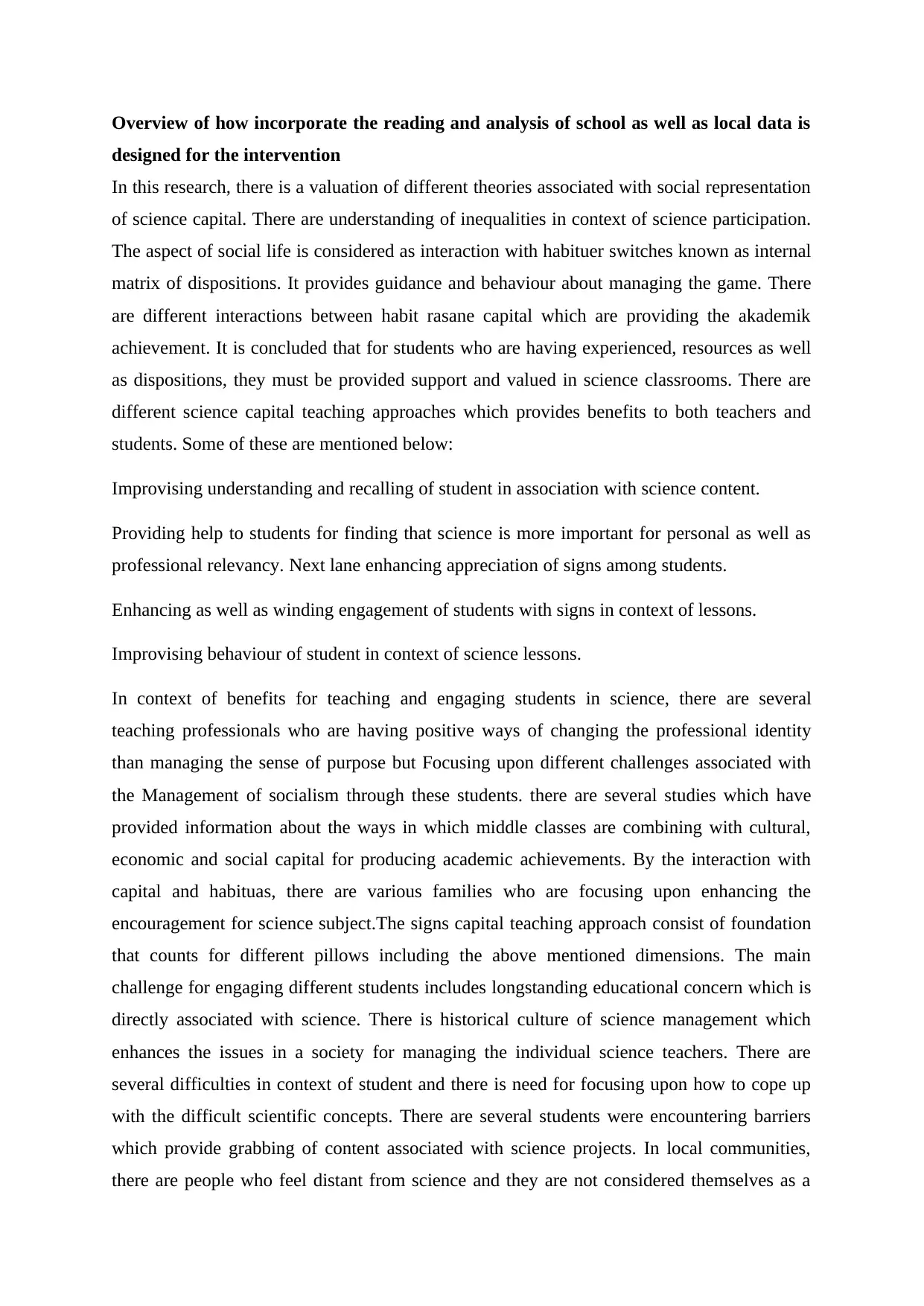
Overview of how incorporate the reading and analysis of school as well as local data is
designed for the intervention
In this research, there is a valuation of different theories associated with social representation
of science capital. There are understanding of inequalities in context of science participation.
The aspect of social life is considered as interaction with habituer switches known as internal
matrix of dispositions. It provides guidance and behaviour about managing the game. There
are different interactions between habit rasane capital which are providing the akademik
achievement. It is concluded that for students who are having experienced, resources as well
as dispositions, they must be provided support and valued in science classrooms. There are
different science capital teaching approaches which provides benefits to both teachers and
students. Some of these are mentioned below:
Improvising understanding and recalling of student in association with science content.
Providing help to students for finding that science is more important for personal as well as
professional relevancy. Next lane enhancing appreciation of signs among students.
Enhancing as well as winding engagement of students with signs in context of lessons.
Improvising behaviour of student in context of science lessons.
In context of benefits for teaching and engaging students in science, there are several
teaching professionals who are having positive ways of changing the professional identity
than managing the sense of purpose but Focusing upon different challenges associated with
the Management of socialism through these students. there are several studies which have
provided information about the ways in which middle classes are combining with cultural,
economic and social capital for producing academic achievements. By the interaction with
capital and habituas, there are various families who are focusing upon enhancing the
encouragement for science subject.The signs capital teaching approach consist of foundation
that counts for different pillows including the above mentioned dimensions. The main
challenge for engaging different students includes longstanding educational concern which is
directly associated with science. There is historical culture of science management which
enhances the issues in a society for managing the individual science teachers. There are
several difficulties in context of student and there is need for focusing upon how to cope up
with the difficult scientific concepts. There are several students were encountering barriers
which provide grabbing of content associated with science projects. In local communities,
there are people who feel distant from science and they are not considered themselves as a
designed for the intervention
In this research, there is a valuation of different theories associated with social representation
of science capital. There are understanding of inequalities in context of science participation.
The aspect of social life is considered as interaction with habituer switches known as internal
matrix of dispositions. It provides guidance and behaviour about managing the game. There
are different interactions between habit rasane capital which are providing the akademik
achievement. It is concluded that for students who are having experienced, resources as well
as dispositions, they must be provided support and valued in science classrooms. There are
different science capital teaching approaches which provides benefits to both teachers and
students. Some of these are mentioned below:
Improvising understanding and recalling of student in association with science content.
Providing help to students for finding that science is more important for personal as well as
professional relevancy. Next lane enhancing appreciation of signs among students.
Enhancing as well as winding engagement of students with signs in context of lessons.
Improvising behaviour of student in context of science lessons.
In context of benefits for teaching and engaging students in science, there are several
teaching professionals who are having positive ways of changing the professional identity
than managing the sense of purpose but Focusing upon different challenges associated with
the Management of socialism through these students. there are several studies which have
provided information about the ways in which middle classes are combining with cultural,
economic and social capital for producing academic achievements. By the interaction with
capital and habituas, there are various families who are focusing upon enhancing the
encouragement for science subject.The signs capital teaching approach consist of foundation
that counts for different pillows including the above mentioned dimensions. The main
challenge for engaging different students includes longstanding educational concern which is
directly associated with science. There is historical culture of science management which
enhances the issues in a society for managing the individual science teachers. There are
several difficulties in context of student and there is need for focusing upon how to cope up
with the difficult scientific concepts. There are several students were encountering barriers
which provide grabbing of content associated with science projects. In local communities,
there are people who feel distant from science and they are not considered themselves as a
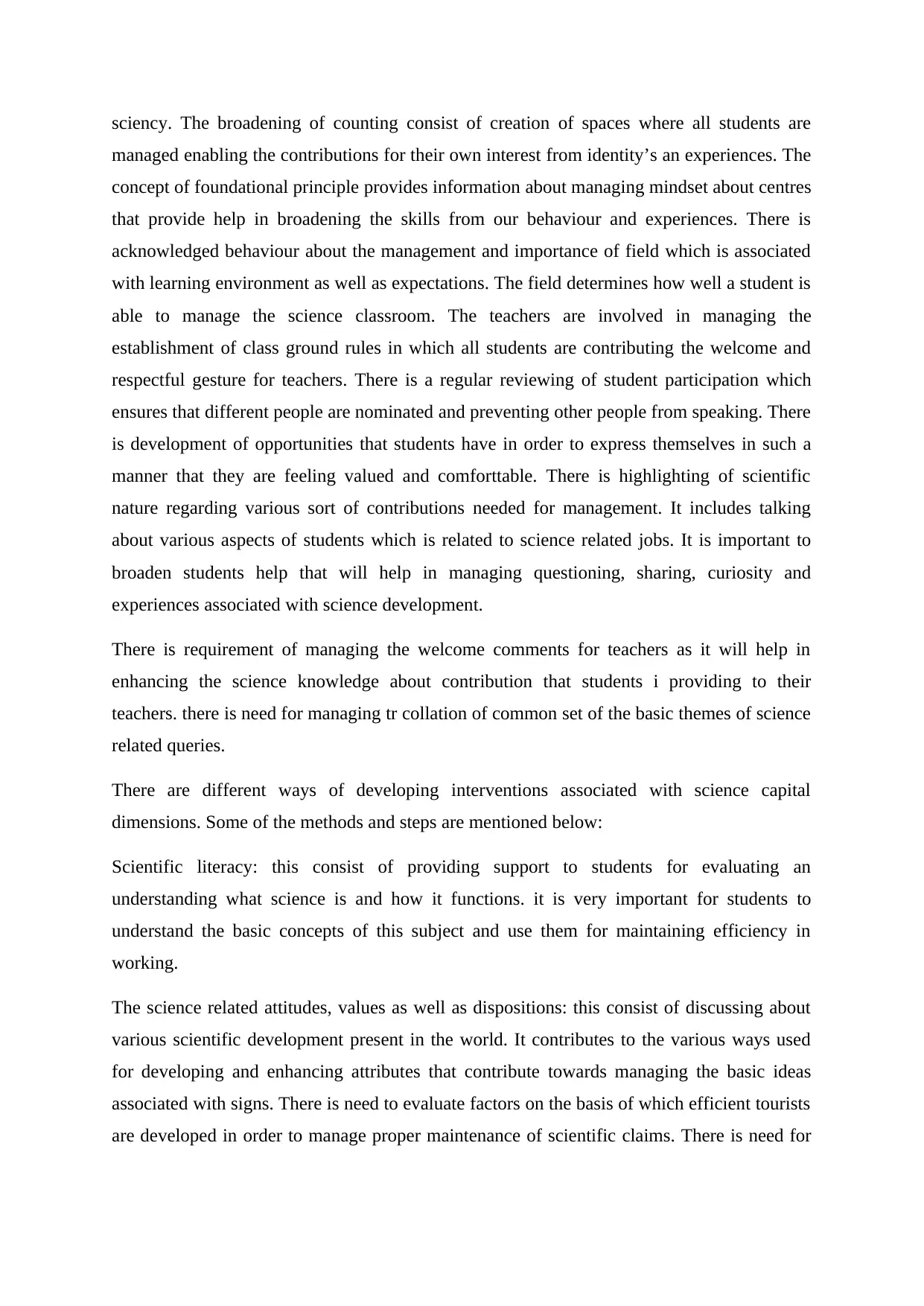
sciency. The broadening of counting consist of creation of spaces where all students are
managed enabling the contributions for their own interest from identity’s an experiences. The
concept of foundational principle provides information about managing mindset about centres
that provide help in broadening the skills from our behaviour and experiences. There is
acknowledged behaviour about the management and importance of field which is associated
with learning environment as well as expectations. The field determines how well a student is
able to manage the science classroom. The teachers are involved in managing the
establishment of class ground rules in which all students are contributing the welcome and
respectful gesture for teachers. There is a regular reviewing of student participation which
ensures that different people are nominated and preventing other people from speaking. There
is development of opportunities that students have in order to express themselves in such a
manner that they are feeling valued and comforttable. There is highlighting of scientific
nature regarding various sort of contributions needed for management. It includes talking
about various aspects of students which is related to science related jobs. It is important to
broaden students help that will help in managing questioning, sharing, curiosity and
experiences associated with science development.
There is requirement of managing the welcome comments for teachers as it will help in
enhancing the science knowledge about contribution that students i providing to their
teachers. there is need for managing tr collation of common set of the basic themes of science
related queries.
There are different ways of developing interventions associated with science capital
dimensions. Some of the methods and steps are mentioned below:
Scientific literacy: this consist of providing support to students for evaluating an
understanding what science is and how it functions. it is very important for students to
understand the basic concepts of this subject and use them for maintaining efficiency in
working.
The science related attitudes, values as well as dispositions: this consist of discussing about
various scientific development present in the world. It contributes to the various ways used
for developing and enhancing attributes that contribute towards managing the basic ideas
associated with signs. There is need to evaluate factors on the basis of which efficient tourists
are developed in order to manage proper maintenance of scientific claims. There is need for
managed enabling the contributions for their own interest from identity’s an experiences. The
concept of foundational principle provides information about managing mindset about centres
that provide help in broadening the skills from our behaviour and experiences. There is
acknowledged behaviour about the management and importance of field which is associated
with learning environment as well as expectations. The field determines how well a student is
able to manage the science classroom. The teachers are involved in managing the
establishment of class ground rules in which all students are contributing the welcome and
respectful gesture for teachers. There is a regular reviewing of student participation which
ensures that different people are nominated and preventing other people from speaking. There
is development of opportunities that students have in order to express themselves in such a
manner that they are feeling valued and comforttable. There is highlighting of scientific
nature regarding various sort of contributions needed for management. It includes talking
about various aspects of students which is related to science related jobs. It is important to
broaden students help that will help in managing questioning, sharing, curiosity and
experiences associated with science development.
There is requirement of managing the welcome comments for teachers as it will help in
enhancing the science knowledge about contribution that students i providing to their
teachers. there is need for managing tr collation of common set of the basic themes of science
related queries.
There are different ways of developing interventions associated with science capital
dimensions. Some of the methods and steps are mentioned below:
Scientific literacy: this consist of providing support to students for evaluating an
understanding what science is and how it functions. it is very important for students to
understand the basic concepts of this subject and use them for maintaining efficiency in
working.
The science related attitudes, values as well as dispositions: this consist of discussing about
various scientific development present in the world. It contributes to the various ways used
for developing and enhancing attributes that contribute towards managing the basic ideas
associated with signs. There is need to evaluate factors on the basis of which efficient tourists
are developed in order to manage proper maintenance of scientific claims. There is need for
⊘ This is a preview!⊘
Do you want full access?
Subscribe today to unlock all pages.

Trusted by 1+ million students worldwide
1 out of 18
Related Documents
Your All-in-One AI-Powered Toolkit for Academic Success.
+13062052269
info@desklib.com
Available 24*7 on WhatsApp / Email
![[object Object]](/_next/static/media/star-bottom.7253800d.svg)
Unlock your academic potential
Copyright © 2020–2026 A2Z Services. All Rights Reserved. Developed and managed by ZUCOL.





